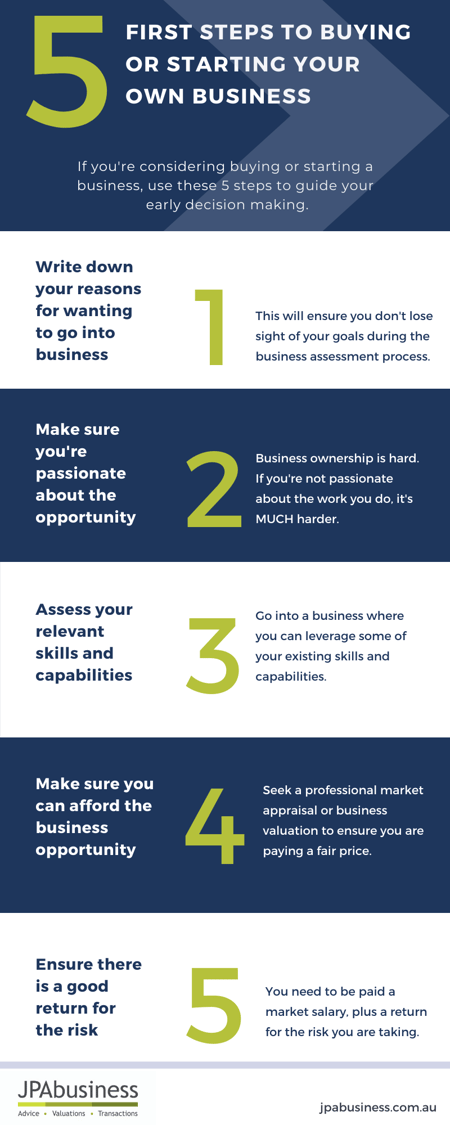Owning your own business can be very rewarding, both professionally and personally, but it’s not all beer and skittles!
As a business owner you take on a lot of risk, you rarely get a mental break – especially in the early days – and you may have to get used to unpredictable earnings.
If you’re considering buying or starting your own business, take a look at the following infographic for some first steps to guide your early decision making.
Now we'll take a look at these 'steps' in more detail.
Step 1: Write down your reasons for wanting to go into business 
Sometimes in the business assessment process you can lose sight of your objectives regarding what you want to achieve. Those objectives may include:
- You’re seeking a work/life balance.
- You’ve designed an innovative product and you want to commercialise it.
- You want to take the experience you’ve gained in an employed environment and try it for yourself in a business environment.
There is often a financial objective, as well. For example, we’ve had clients say: "We’ve gone through a family succession issue. We’ve been employed by the family company for years, but now we want to get out and buy a business for ourselves. We need to earn a net $3000 a week after paying all bills and our wages, because we have commitments we need to cover."
Another example may be that you have some funds to invest and you like the idea of owning a business. You plan to put the business under management, along with some personal involvement, and you want a return on investment of 30% after tax.

Step 2: Make sure you’re passionate about the opportunity
Before you start focusing on what it costs, whether you can pay for it, whether you should buy it or start it up yourself, set aside the money issue and think: ‘Am I passionate about this? If I were here in five years’ time would I still have a passion to do this?’
Really test yourself on that because this is a critical issue: unless you have the passion for it, you should be very careful about stepping into a business purchase.
Step 3: Assess your relevant skills and capabilities
People often come to us with business opportunities they’ve found on the internet, in newspapers, from talking to business brokers and advisors, business owners and so on.
For example, they may be currently employed in the financial services sector in a metropolitan area and they come with an opportunity to purchase a regional hardware business.
They say: "We want to buy this hardware business because we would like a tree change to a regional area. We also want to buy a business our teenage children can work in."
Our response is: "That’s fine, but what have you got in your capability, in your kit bag of experience now, that is strongly transferable into this business?"
There is a big jump between financial services and hardware!
(In our fictitious example it just so happens the client was a builder by trade before going into financial services – a happy ending!)
The point is, make sure you go into a business environment where you can leverage some of your skills and capabilities.
It’s no different to getting a new job – you need to start from somewhere. There’s a much higher risk if you swap from one sector to another with no experience.
Step 4: Make sure you can afford the business opportunity
What’s the business worth and have I got sufficient funds to invest?
Initially, before you get into a detailed assessment about whether the business stacks up for you, get some advice about whether the asking price is reasonable based on the business’s performance and calibrate that against the funds you have available to invest.
Those need to stack up, otherwise you’re just kicking tyres.

Step 5: Ensure there is a good return for the risk
Buying or creating a business means you can be buying a volatile revenue stream that is highly dependent on yourself, the size and shape of the market, external factors and trends.
For this reason you need to be sure you’re getting an adequate financial return for your risk.
A common mistake is for people moving from an employed environment to a business to think: "If the business can match my current wages, I’ve earned enough from the business."
Going into business is more than buying yourself a job.
If you’re working full time in the business you’ve bought, you need to be paid a market salary for the work you do. But you also need a return from the business over and above that salary to account for the risk you’re taking.
So make sure, in talking to your advisor and analysing the business opportunity, the return is there. Otherwise you’re really just going into a lawn-mowing business with one mower and one person pushing it – you – and no real opportunity for a dividend premium.
…but be realistic about that return
The reverse of what I’ve just discussed is that many people coming from an employed environment evaluate a business based on whether it will pay them the same salary they’re on now.
For instance, we’ve had people come to us from relatively senior management roles where they’ve earned $250,000. They’ve looked at a business and said: "Right, it needs to pay me $250,000 a year plus a return."
I can understand that desire because people tend to have financial commitments in line with their salary.
However, when considering a business purchase, the better test is to look at what your role in this business would be worth in the market.
So if you’re coming from a high-priced role in another industry, you’ll find it very difficult to make the jump into a business environment if you stick hard and fast to that salary without looking at comparable wages for the new role in the sector you’re moving into.
Instead, you need to take into account the broader forms of reward. Remember the earnings from owning a business are not just the salary or drawings you might have, but can come in the form of additional payments or dividends if the business performs well.
If you would like advice about buying or starting your own business, contact the team at JPAbusiness on 02 6360 0360 (Orange) or 02 9893 1803 (Parramatta) for a confidential, no-obligation discussion.
 James Price has over 30 years' experience in providing strategic, commercial and financial advice to Australian and international business clients. James' blogs provide business advice for aspiring and current small to mid-sized business owners, operators and managers.
James Price has over 30 years' experience in providing strategic, commercial and financial advice to Australian and international business clients. James' blogs provide business advice for aspiring and current small to mid-sized business owners, operators and managers.



